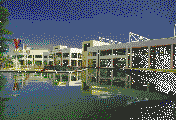

Sandra is IFIP TC3 Vice Chair (Asia Pacific) and ACS National Education Chair. As a computer educator of 20 years standing, she has been active in ACS/IFIP activities for over fifteen years. In addition to her national activities, she has organised two TC3 working conferences and WCCE90, the World Conference on Computers in Education which was held in Sydney in 1990 attracting over 2400 delegates. She is on the Programme Committee for WCCE95 (IFIP@CS.ASTON.AC.UK) to be held in the UK in July this year and EdMedia95 to be held in Austria in June. Now she's doing Teleteaching 96. Work-wise she recently moved from being founding Director of the Interactive Multimedia Learning Unit at The University of Melbourne to founding Director of Educational Media Services at the University of Wollongong.


The National Convention Centre, is one of the most modern and largest convention venues in Australia. It offers flexibility and state-of-the-art conference technology in Canberra. The main venue will be equipped with the most advanced technology available for real-time multi-media presentations, by noted international speakers. With its city centre site in a park landscape and leading hotels close by, it is just a short stroll away from the shopping arcades and near by Lake Burley Griffin.
SANDRA: The University of Wollongong hosts a consortium of thirteen universities who provide fee-paying post-graduate courses via SBS Television. Called PAGE the consortium was having high level discussions with the Department of Employment, Education and Training about some new initiatives that we are brewing.
TOM: First visit to the National Convention Centre, would you like a tour?
SANDRA: No, been here to attend and organise quite a few education conferences.
TOM: Well our readers might like to see it, stand over there under the sign and I will take your photo.
Okay, now at the front door (you better look hi-tech, so hold up your mobile phone and lap-top):
Here are the main theatre (where the opening and closing ceremonies of the conference will be held, plus other major events):
TOM: Big isn't it? Time for lunch, let's go over to the Park royal hotel (next to the convention centre).
SANDRA: Sorry I have already had lunch.
TOM: Well, that gets the "Let's Do Lunch" series off to a bad start. We are trying to promote the hospitality facilities around the conference venue remember. What about a cup of coffee?
SANDRA: Okay, you are paying.
TOM: Last time I saw you was at an education multimedia convention in Old Parliament House, what are you doing with multimedia now?
SANDRA: The University of Wollongong produces material for the PACE program, broadcast on SBS television. That's just conventional TV at present, but we are planning to go to multimedia.
TOM: How did you come to be conference chair?
SANDRA: I didn't volunteer!! I'd had enough of running conferences.
TOM: So why are you conference char?
SANDRA: Ashley Goldsworthy (IFIP'96 Organising Committee Chair) and Professor Dr Egon Horbst (Program Committee Co-chairs) told me I was.
TOM: So why are you the conference chair?
SANDRA: Since they wouldn't take no for an answer and I have organised some many conventional conferences, I thought we would do a radically different conference this time: a virtual conference.
TOM: Virtual conference: how?
SANDRA: We are going to bring noted international authorities on education to Canberra for this conference. However a lot of people interested in education (and not just professional educators) can't afford the time or travel cost to come to Canberra. We will bring the conference to them.
TOM: How?
SANDRA: By practising what we IT people preach and using networking technology. We can use the Internet, video-conferenceing and conventional TV broadcasting.
TOM: Sounds risky. IFIP is a pretty conservative organisation, will they cope with this? How are we going to pay for all of this?
SANDRA: If they don't like it they can get someone else to run the conference! It is a risky strategy, but there are enough "pay your money, sit in the char and listen" conferences already. This won't be the first conference in Australian to make extensive use of networking; there is the Asia-Pacific regional WWW conference at Charles Sturt Uni (Wagga Wagga) in September, for example. However, funding is an issue, because up until now Internet video conferences have been free.
TOM: How about sponsorship? The Australian Government is offering millions for multimedia projects. Also we could have a shareware conference: people at network access points would pay a small amount to participate, but there would be no access control (we would have to trust them to pay).
SANDRA: Sounds good, now who's being radical?
TOM: Okay, but "talking heads" video conferences can be pretty boring.
SANDRA: It doesn't have to be some people reading their paper in front of a video camera. We can try some new formats. How about a "great debate" or a "current affairs" style presentation?
TOM: If we do this with networking, is anyone want to come to Canberra? The local tourist bureau isn't going to like it.
SANDRA: Previous international education conferences in Australia have been very popular. About 100 of the world's top computer education people have already said they are coming. For those who can make it to Canberra for the "live" conference there will be advantages. A conference isn't just the presentation of information, its the people to people networking. Difficult to capture that on a data link.
Also there is the tourism aspect to visiting Australia and Canberra. September is a very pleasant time to visit. We might look at arranging "technical host visits".
TOM: What are technical host visits?
SANDRA: Institutions offer to host a visit for a day or so. This isn't like a bus tour of a facility. These are individual hosted visits. I expect the Universities and research facilities near Tourist spots, like the Gold Coast, Great Barrier Reef, Air's Rock and Darwin to be particularly popular!
TOM: If the conference isn't presenting papers, will there be proceedings?
SANDRA: On CDROM of course! We did the IFIP WG3.2 working conference this way in July this year and it worked well.
TOM: With interactive links I suppose it would be "Australia this Minute". And I suppose we can get some of that CD-ROM funding the Australian Government is offering?
SANDRA: We'll see.
TOM: How does Australia rate in the IT education business? All this multimedia glitz is one thing, but are we going to attract serious educators to this conference?
SANDRA: The Program Committee for WCCE95 - Sixth IFIP World Conference on Computers in Education has selected 61 papers from Australians, out of a total for of 90. have been accepted for presentation. Australia was second only to the UK (with 70 accepted). Australia is a significant force in computer education and so we will attract noted overseas educators to visit.
TOM: Coffee's finished, would you like to meet Annette Palm, from the conference Secretariat?
Republishing of the LDL series for non-profit purposes is granted. Please contact the IFIP'96 Secretariat for further details, including higher resolution images and video material.
http://www.tomw.net.au/ifip96br.html